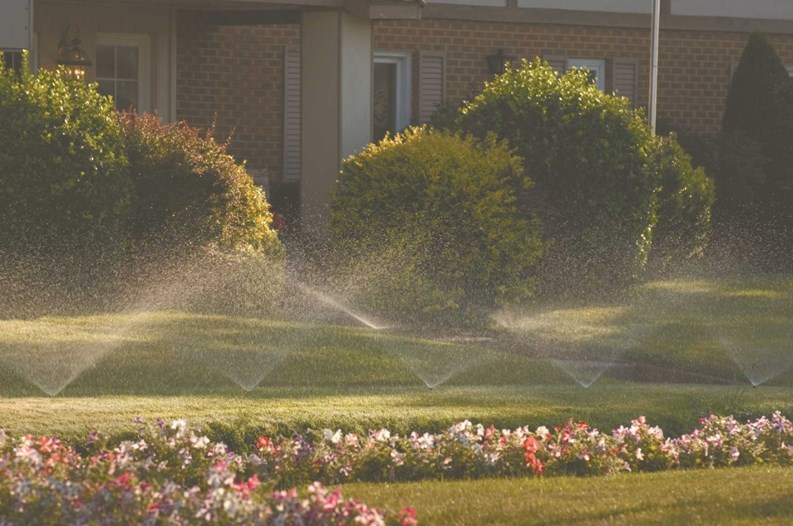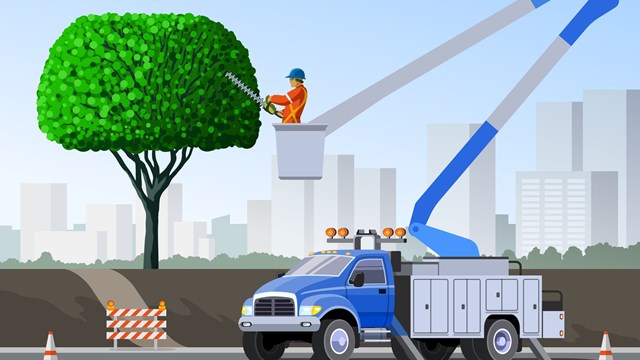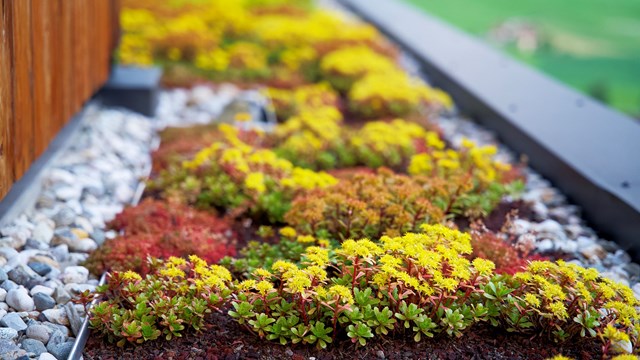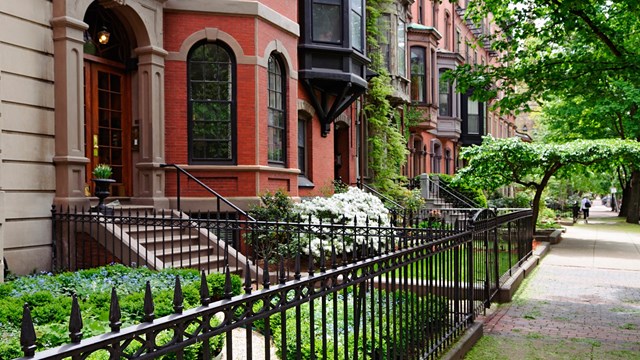One of the things that attracts people to a condo or HOA are the beautiful grounds and lush landscaping that surrounds the property. Because of the topography of New England, it’s almost always necessary for properties to use irrigation technology to keep their lawns, trees and shrubs healthy and green.
“Whether you are dealing with flowers, trees or shrubs, they all have different watering requirements, which are influenced by a building’s location, soil type and site topography,” says Rick Landgraber, president of Elite Landscaping Inc., which is located in South Plainfield, New Jersey but also does work in Connecticut as well. “Therefore, knowing how, when and where to water and what kind of irrigation equipment supports the microclimates found throughout condominium properties is vital.”
Anyone who has ever lived in a condo has probably seen the sprinklers go on and off, and while you may not think it’s that big of a deal, using the proper system and controlling water levels for all areas of the property can be a challenge. In the past, associations may have relied strictly on sprinkler systems or gardeners who would water the property with hoses, but irrigation systems have come a long way and today’s watering technology is cheaper, greener and much more sophisticated. Long gone are the days when installers would drop pipe haphazardly into the ground figuring that spraying around large volumes of water would make up for a hit-or-miss installation.
New and Improved
Irrigation controllers have become extremely sophisticated, going as far as adding computer technology to improve its timing and diagnostics. Unfortunately for landscapers, this doesn’t end the need to connect the controller to every valve with a bundle of dedicated buried wire.
The programmable valve is another innovation that uses no electricity and is being sampled by some area landscapers. The valve can be programmed to open and close in any combination of settings based on a cycle of every seven times the water is turned on. It is small enough to be installed under a sprinkler head, or in another version, can be used in a water line. This innovation means that each sprinkler head can be programmed to open at different times than the others in the same zone.
Materials have also changed a lot in recent years, with newer type heads designed to last longer. Spray head sprinklers are designed for more durability and uniform watering and are ideal for lawns, flowerbeds, and shrubs. Meanwhile, new plastic valves are constructed for reliability and are easy to install for a multi-valve system.
Spray head sprinklers are designed for more durability and uniform watering and are ideal for lawns, flowerbeds, and shrubs. Meanwhile, new plastic valves are constructed for reliability and are easy to install for a multi-valve system.
“There are two areas to look at when looking at technical advances in irrigation: The application side—what’s actually applying the water—and there’s the other side, what’s controlling the irrigation schedule,” Jim McGovern, the president of the Irrigation Association of New England (IANE) and the New England sales manager of Hunter Industries, says. “There’s a big push in the industry towards lower precipitation type products—products that water at a slower rate. The reason that has become popular is because it reduces run-off. It’s the difference between flooding the place and actually irrigating the place. There’s also a big push in the industry towards multi-stream, multi-trajectory rotors.”
“On the control side,” McGovern continues, “there’s been a big movement towards what we call smart technology for irrigation controllers. The direction the industry is going is evapotranspiration-based (ET) sensors. These are sensors that use atmospheric conditions to make a measurement of how much moisture is leaving the plant life in soil through evaporation and transpiration. They’re trying to nail down the exact calculation because in the irrigation world all we really want to do is just replace [the water] that is exactly needed for the plant,” he says.
Advice from the Experts
For an HOA or condo considering changing out its landscaping and irrigation methods, it’s important to keep a few factors in mind such as topography, the slope of the land and soil characteristics, when selecting a system to ensure maximum efficiency. But above all, available water sources are the most important consideration to make, McGovern says.
“The first thing you have to do is look at water source and whether the clients have a municipal water feed or a well system or are pulling out of a retaining pond,” McGovern says. “You can’t really design a system without knowing where your capacities are, and the capacity comes from the source. Contractors also look at things like water window. If it’s an HOA and there are people around, when do they want to water? Do they want to avoid watering when people are out and about in their yards or walking up the sidewalks in case there is any overspray?”
The science of watering a property has gotten really strong, but there are mistakes that can be made due to draining, different zones and watering too much. A lot of HOAs will have areas in between the buildings where swales build up and it’s important to install heads in the areas between the houses to help this. Sometimes, trees may have been added or removed from a property and the turf needs to be reevaluated for irrigation needs in these cases, or problems can arise.
Irrigation By Seasons
An irrigation contractor will do more than just put in sprinkler heads and clocks; they will work with you throughout the year to ensure that the landscaping is looking its best at all times.
In the spring, all drain valves and plugs are closed to look for any leaks in the system. Each individual zone is checked and all heads are cleaned and adjusted to maximize proper efficiency. Once everything is done, the system is reset for proper zone coverage and the control time is reset for optimal spring watering needs.
When the cold weather comes around, valves and drains are shut off and compressed air is pumped into the main lines, valves and heads to ensure the system is completely water free.
Water Conservation
Eric Zima, president of North East Irrigation in Milford, Massachusetts, says that you need to deal with environmentalists and even government legislation when dealing with water issues.
“Water is becoming an ever-more precious resource,” he says. “Everywhere we look, we’re starting to see restrictions being put in place. So while on one hand we want to promote conservation of precious water resources, on the other it becomes ever more of a challenge to keep the grass green.”
According to McGovern, interest in water conservation served as the major inspiration for new smart water technology in the irrigation industry. “Certainly in New England we have less of an issue with lack of precipitation than in other parts of the country, but if you go to the Southwest and the West Coast where they get minimal precipitation, water conservation is a big issue,” McGovern says. “Even here in New England, we get a fair amount of precipitation but water conservation is still an issue because of growing populations. We’re a very densely-populated area up here in New England, and there is a lot of demand on water systems because of that dense population.”
Licensed and Insured
Before hiring someone to fill your irrigation needs, a condo or HOA should make sure that the company is licensed and insured and has met the irrigation guidelines of the state that they are in. “My advice would be to ask the contractor if they hold certifications—not that it has to be the end-all-be-all, but it is proof that they are further educating themselves on the best practices,” McGovern says. “There are states where licensing is an issue,” he continues. “If you look at the state of Connecticut, you have to be a licensed irrigation contractor. Massachusetts doesn’t have a licensing program or requirement. Rhode Island has a licensing program, New Hampshire, Maine and Vermont do not. Connecticut and Rhode Island are the only states in New England that require contractors be licensed.”
In an effort to make it easier for Massachusetts residents to find quality irrigation services, IANE has filed a bill with the state of Massachusetts called the “Registration of Irrigation Contractors,” which will create a registration program of contractors if passed. “Having a registration program certainly helps the association and its members from the standpoint of being recognized by the state,” McGovern says.
To find a qualified New England irrigation contractor, visit www.irrigation assocationne.org.
Final Thoughts
“Adding a new irrigation system is one of the best investments that an association can make,” Landgraber says. “Using features such as ET controllers, drip irrigation, and precision nozzles, we are able to install your irrigation system to save you money on your water bill and our systems lead to healthier turf, healthier plants, and greater curb appeal.”
No one should take their landscaping for granted and for a condo or HOA who wants to attract more people, they should really look into upgrading their irrigation system. That way your grass is sure to be greener on your side of the fence.
Keith Loria is a freelance writer and a frequent contributor to New England Condominium. Editorial Assistant Enjolie Esteve contributed to this article.







Leave a Comment